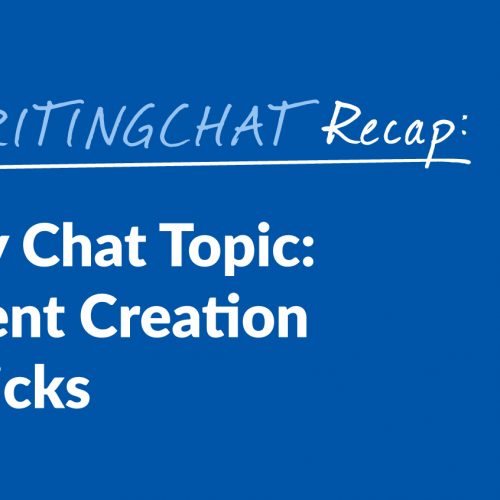#ContentWritingChat Recap: 2017 Content Creation Tips and Tricks
This week on #ContentWritingChat, we decided to switch things up a bit! As you may know by now, we typically have a guest host join us every week. Well, this Tuesday we decided to have a community chat and just let our participants be the main focus. After all, we do love each and every person who joins us for an hour of fun every Tuesday! This community chat went so well that we’re actually going to incorporate them into our #ContentWritingChat schedule every month. We’re even going to give you you the opportunity to give input on upcoming chat topics, so stay tuned! But for now, let’s dive into the recap of this week’s chat where we talked all about content creation tips and trick for 2017! #ContentWritingChat Recap: 2017 Content Creation Tips and Tricks Welcome to #ContentWritingChat! Today, we’re having a community chat all about content creation tips and tricks! ?? pic.twitter.com/fNahyGR0hz — Express Writers (@ExpWriters) July 11, 2017 In Tuesday’s chat, we invited everyone to join us and talk content creation. Being that so many members of our #ContentWritingChat community are writers, it’s no surprise that they all had some great advice to share. Let’s get to it! Q1: When it comes to content, what’s the first step you should always take before you begin creating? Before you dive head first into writing content, there are a few things you should do beforehand! What might those things be? Here’s what a few of our participants believe are the essential first steps: A1: Think — what does my audience/ideal customer need to see? #ContentWritingChat https://t.co/f0CaOh27Pk — ThinkSEM (@ThinkSEM) July 11, 2017 Sarah is spot-on with her answer! She knows that you have to determine what your audience needs to see before you can start with content creation. After all, if you aren’t sure what your audience needs, how can you create content that will resonate? A1: Get to know your audience. Learn what information they need and how they want to receive it. #contentwritingchat — Netvantage Marketing (@netvantage) July 11, 2017 As you spend time getting to know your audience, you also want to determine how they like to receive content. Do they prefer a specific content format or a certain platform? These are all important things to consider before you create. A1. Date your audience. Get to know them before asking them to take a content journey with you. #ContentWritingChat — Bourbon & Honey (@BrittanyBrander) July 11, 2017 We like the way Brittany put it! Date your audience to get to know them before taking them along on your content journey. A1 Have a message! If you have no takeaway point, then your content becomes rather meaningless! #ContentWritingChat pic.twitter.com/lghgUkqHXI — HeyOrca! (@HeyOrca) July 11, 2017 Having a message behind your content is important as well. You want your audience to read your content and be able to walk away with something of value. Make sure your content always serves a purpose. A1 Be really clear – know WHY you’re abt 2 create this content. What purpose does it serve? Are you creating to create? #ContentWritingChat https://t.co/vNHy0UdugG — Zala Bricelj (@ZalkaB) July 11, 2017 Zala also agrees that your content needs to serve a purpose. Everything you publish online should add value to your audience in some way. A1. Research! #ContentWritingChat — Megan McCarthy (@ImMeganMcCarthy) July 11, 2017 As Megan mentioned, research is a very important step to content creation. Before you can begin writing, you may need to conduct research to learn more yourself or so that you have sources to back up your ideas. A1 Discover trends/ research topics that do the best on the specific platform you’re writing for. Analyze audience & SEO #ContentWritingChat — Julia McCoy ? (@JuliaEMcCoy) July 11, 2017 Julia’s advice is to begin by discovering trends and topics and perform the best on the platform you’re writing for. You can then analyze the audience and SEO. A1: Define goals, marketing objectives. How will content help you get closer to achieving those goals #ContentWritingChat — GetApp_Marketing (@GetApp_Mkting) July 11, 2017 You can’t forget to set goals either! When you have clear goals in mind, you’re able to create the content that will help you achieve what you want. Q2: What types of content do you create to build and maintain an authoritative, ROI online presence? There are all kinds of content types out there in the online world! For that reason, it can be difficult to choose what’s right for you. Here’s some advice for you if you want to create authoritative content that helps you get results: A2 Whatever types your audience prefers. Authority is a measure of trust, and speaking their language builds trust. #ContentWritingChat — Lex (@estherproject) July 11, 2017 Les knows that it’s important to consider the content types your audience prefers. If your audience loves to read, they’ll probably enjoy your long-form blog posts. If they’re more visual, they’ll be happy to watch your YouTube videos and live broadcasts. Always keep their preferences in mind! A2: Relevant, helpful content via a variety of mediums – must consider that people absorb information differently #ContentWritingChat — Elizabeth Greenberg (@BettaBeYou) July 11, 2017 Elizabeth recommends trying multiple mediums for your content. This is a great opportunity to see what performs best for you and what your audience likes the most. Whichever content type you choose, it’s crucial that you share a relevant, helpful message. A2 NEVER overlook your core content types if you want to build a killer authority SEO presence – blogs & landing pages #ContentWritingChat — Julia McCoy ? (@JuliaEMcCoy) July 11, 2017 Julia urges you not to overlook your core content types. Make sure you aren’t neglecting your blog and the various landing pages you have on your site. A2: To build your brand as a thought leader, I find the best form of contents are Infographics & blog Articles #ContentWritingChat — J. Pablo H3 (@HinoIII) July 11, 2017 Infographics and blog posts are two ways … Read more



